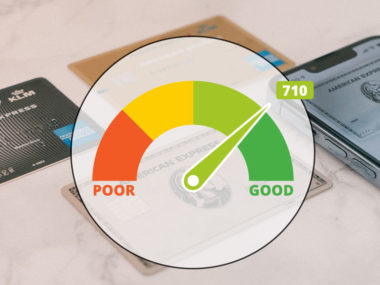As far as Experian’s classifications go, a 666 credit score is considered “Fair.” The positive news is that it’s also right on the heels of a “Good” credit score, which ranges between 670 and 739. Other ranges include:
- 300 to 579: Very Poor;
- 740 to 799: Very Good;
- 800 to 850: Exceptional or Excellent.
In addition to Experian, several other credit reporting agencies exist, including Equifax and TransUnion, each of which has proprietary formulas for calculating credit scores. As such, your credit score can vary by 50 points or more between rating agencies.
Either way, a higher credit score opens up more opportunities, including lower interest rates on credit cards, home loans, and personal loans, as well as better insurance rates. In many instances, you could even qualify for a 0% interest rate.
Whether you obtained your free annual credit report or you already have monitoring in place, let’s start by taking a look at some of the reasons why you might have a 666 credit score.
Table of Contents
Why Your Credit Score Is 666
Ultimately, we can’t say exactly which factors have caused your credit score to be what it is since companies like Experian calculate your credit score using a mix of different variables. And as we outlined earlier, your credit score can vary between one reporting agency and another.
With this said, here’s a quick overview of the different factors that constitute your credit score and information on how not following them to the letter can drop your credit score a significant amount:
Payment History
Your payment record constitutes 35% of your score and relates to whether you’ve continuously made on-time payments to your creditors. Examples of actions that can hurt your score include:
- Late payments on credit cards or other loans;
- Debts that went to collections or were charged off;
- Bankruptcy and foreclosure;
- Settling your debts for less than you owe;
- Refinancing a loan;
- Not having a credit card.
You can maximize your credit score by owning a credit card, making payments on time, and avoiding charge-offs or collections requests.
Credit Utilization
Your credit utilization ratio references how much credit you have available and makes up 30% of your credit score. Credit utilization errors that can lead to a 666 credit score include:
- Maxing out or canceling one or more of your credit cards;
- Consolidating your debts;
- Missing a payment;
- Refinancing a loan;
- Errors on your credit report.
The bottom line is that multiple lines of maxed-out credit can negatively impact your credit score.
Length of Credit History
How long you’ve had credit makes up another 15% of your score. The following actions can negatively impact your score.
- Applying for several credits cards within a short time;
- Not having or canceling a credit card;
- Refinancing a loan;
When it comes to your score, you’ll also need to pay attention to newer lines of credit.
New Credit
The details relating to recent credit accounts you’ve opened determine about 10% of your score. Examples of new credit scenarios that can decrease your credit score include:
- Hard credit inquiries;
- Applying for several credits cards within a short time;
- Consolidating your debts;
- Refinancing a loan.
Now that we’ve covered how old and new credit can impact your score, let’s mix things up.
Credit Mix
Finally, the credit-mix variable relates to different credit types in your name (e.g., credit cards, mortgages, auto loans) and comprises 10% of your score. You can hurt this variable by applying for too many credit cards. Also, it’s to your detriment if you have a thin credit mix with only one or two types of credit in play.
Fortunately, no one’s credit score is set in stone, so you can improve your credit score by remedying the underlying causes. For example, paying off an outstanding debt — or at least agreeing to a settlement, can boost your score relatively quickly.
What Can You Do With a 666 Credit Score?
Although a 666 credit score is classified as “Fair,” there are still many things you can do. For example, you can:
- Take out a secured credit card.
- Apply for traditional credit cards. Keep in mind that you might encounter higher interest rates or an annual fee.
- Apply for a personal loan.
- Apply for alternative bad-credit loans.
- Open a credit card at your favorite store and earn rewards in the process.
Don’t count on any big initial bonuses, though. You probably also won’t be able to open an airline or hotel card.
Other variables to keep in mind with a 666 credit score: you won’t get the best mortgage, auto loan, or insurance rates. However, depending on the lender, you might score a personal loan or act as the single signer on an apartment rental.
How to Repair a 666 Credit Score
The ‘secret’ to rebuilding your credit and fixing your 666 credit score isn’t anything new and simply involves maintaining good financial habits over the long term.
In other words, there’s no silver bullet that will automatically increase your credit score. It took a while for your score to get to this point, and it will take some time for it to go back up.
Fortunately, it’s super easy to increase your score as long as you follow sensible financial guidelines, including:
- Paying down your debt when the bill is due. If you’re 90 days or more behind on some of your payments, you could see a 50-point (or more) increase in your credit score once you begin paying on time.
- Regularly using credit cards and paying down (or off, ideally) the balance each month;
- Maintaining low credit utilization rates;
- Maintaining a lengthy credit history;
- Avoiding taking out, or applying for, a lot of credit in a short period;
- Maintaining myriad types of credit, including credit card, auto, and home.
Another option is to reach out to a professional credit repair company, which can help improve your credit after charging a fee for their services. Compared to credit counseling organizations, credit repair companies start by identifying negative marks on your credit, such as charge-offs, multiple late payments, bankruptcies, and repossessions.
Then, the credit repair company reaches out to your creditors and requests that they verify your loan while disputing some negative marks or sending cease-and-desist letters to a debt collection agency.
In some instances, the credit repair company might recommend taking out new credit to help improve your score.
Pro tip: It’s essential to keep in mind that you can perform many of the same actions as a credit repair company, but without paying any fees.
Image Source: https://depositphotos.com/





